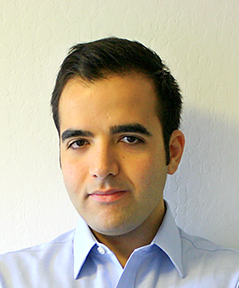An Ecosystem of Integrated Physiological Monitoring Platforms for Personalized Medicine

Speaker: Sam Emaminejad
Affiliation: UC Berkeley and Stanford School of Medicine
Abstract: The number of interconnected sensors is expected to increase beyond trillions of units over the next decade, representing about 1000 devices per person in the world. The intersection of this trajectory with the pressing need for lowering healthcare expenditures necessitates a subset of these devices geared towards health monitoring of individuals to enable personalized medicine. To this end, I aim to develop an ecosystem of human biomonitoring platforms that can continuously analyze various humans’ physiological samples and their surrounding environments. This approach allows for the collection of large data sets which can guide clinical investigations and ultimately generate predictive algorithms to understand our clinical needs. In order to realize these platforms, an integrated-system approach must be adopted to accurately process and seamlessly relay the originated information from the sensor interface to cloud servers online. Moreover, to provide insight into the physiological status of individuals, these devices should quantify the abundance of various micro- and nanometer-scale biomarkers in humans’ samples. Hence, at the sensor-level, novel MEMs/NEMs-based technologies must be developed to perform actuation and sensing at length-scales comparable to the size of the target biomarkers. During this talk, I will discuss the design considerations that must be met to allow for the extraction of meaningful information from biological samples. In this context, I will present a flexible fully-integrated and wearable perspiration analyzer that accurately and simultaneously measures the main electrolytes (e.g. sodium and potassium) and metabolites (e.g. glucose and lactate) of sweat in real-time while calibrating the sensors’ response against the change in skin temperature. Furthermore, I will present the unprecedented micro/nanoscale actuation and sensing functionalities that I demonstrated in the context of portable monitoring platforms to control, isolate and sense the biomarkers of interest. I will conclude my talk with a discussion of future research directions which prelude my long term vision of developing an ecosystem of integrated portable, wearable, and in–vivo sensors to facilitate large scale population and epidemiological studies.
Biography: Sam Emaminejad received his BASc (2009) and MS/PhD (2011/2014) degrees in Electrical Engineering from the University of Waterloo and Stanford University, respectively. He pursued his PhD thesis at Stanford Genome Technology Center where he focused on applying micro- and nanotechnologies to develop low-cost and integrated biosensing and bioeletronics platforms. As a joint-postdoctoral scholar at UC Berkeley and Stanford School of Medicine, Sam is currently exploiting flexible electronics technology to develop non-invasive wearable sensors and systems for physiological monitoring and personalized medicine applications. Sam has previously worked as an ASIC and Analog Designer in semiconductor companies such as STMicroelectronics and Analog Devices. Sam was awarded Microsoft Merit and Natural Sciences and Engineering Research Council (NSERC) scholarships and was the recipient of the Best Paper Award at the IEEE Sensors conference in 2013. His current work has been widely reported by various media outlets including Nature, Science, Time, The Wall Street Journal, Newsweek, etc.
For more information, contact Prof. Rob Candler (rob.candler@gmail.com)
Date/Time:
Date(s) - Apr 07, 2016
11:00 am - 12:15 pm
Location:
EE-IV Shannon Room #54-134
420 Westwood Plaza - 5th Flr., Los Angeles CA 90095
